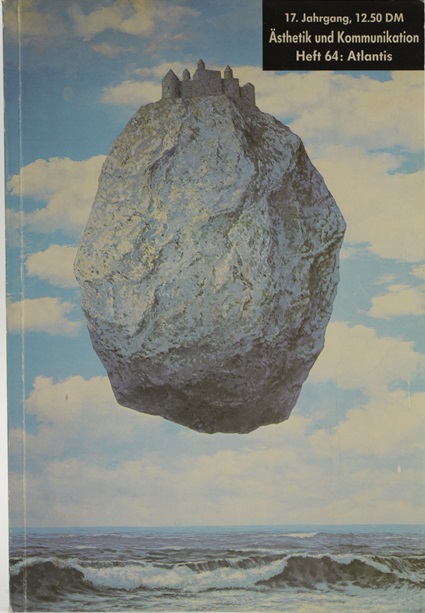
Heiner Müller




Heiner Müller (1929-1995) was one of the most important German playwrights and a cultural beacon of the GDR (German Democratic Republic, the socialist eastern German state). Heiner Müller repeatedly saw Atlantis in works that inspired him. But there was no mention of Atlantis in these works. And Heiner Müller repeatedly used Atlantis as a cipher. But this cipher never really had anything to do with Plato's Atlantis.
For his play "Leben Gundlings Friedrich von Preussen Lessings Schlaf Traum Schrei – Ein Greuelmärchen" (translated: Life of Gundling Frederick of Prussia Lessing's Sleep Dream Scream – an atrocity story), which premiered in 1976, Heiner Müller was inspired by the works of the French author Lautréamont. Lautréamont (1846-1870) is regarded as a writer of civilizational disruption who glorifies evil in his works. His penchant for irrationality also made him a forerunner of surrealism. Lautréamont's impact cannot be overestimated.
Inspired by Julien Gracq (1910-2007), Heiner Müller was of the opinion that the political left was one-sidedly rational and had thus left essential forces for moving the masses to the political right. Heiner Müller wanted to change this. To this end, he drew on the cult of evil founded by Lautréamont.
In Lautréamont's main work "Les Chants de Maldoror", the figure of Maldoror becomes the personification of evil. In the ninth verse of the first canto, homage is paid to the sea, which always remains the same. Heiner Müller understood this as a reference to Atlantis. But that is wrong. Lautréamont does not speak of Atlantis. Nevertheless, Heiner Müller made Maldoror the "Prince of Atlantis". For Heiner Müller, Atlantis is the cipher for the irrational, the evil, the emotional.
As a cipher for rationality and order (and Christianity, as a cipher for the good), Heiner Müller chose – quite rightly – Prussia. Prussia does indeed stand for rationality and enlightenment: Immanuel Kant was one of the main thinkers of the Enlightenment and of critical rationalism, Frederick the Great introduced the Enlightenment and freemasonry to Germany, the Humboldt brothers founded a liberal conception of the state, scientific research into nature, as well as the Humboldtian ideal for schools and universities, and so on and so forth.
Using these two ciphers, Heiner Müller came to formulate the astonishing statement in notes written around 1976: "Blasting of Prussia by Atlantis". What is meant, of course, is the overcoming of order and rationality by irrationalism, by chaos, by evil, for the benefit of the political left for the movement of the masses.
Literature: Storch/Ruschkowski (2007) pp. 73, 85-84, 102 f.
Antonin Artaud (1896-1948) was a French actor who went to Central America and experimented with drugs among the Indians there. He developed the pseudo-scientific theory that the rituals of the Indians could be traced back to the royal ritual of Atlantis. And that the Atlanteans were described by Plato as a magical race. Antonin Artaud's writings had a great impact.
Of course, everything Antonin Artaud had to say about Atlantis was wrong. But Heiner Müller took up the idea and, building on it, planned a sequel to "Leben Gundlings" under the title "Antonin Artaud". For Heiner Müller, Antonin Artaud was a welcome modern representative of the irrationality he was looking for. The play was never completed.
Literature: Storch/Ruschkowski (2007) p. 92 f.; Artaud (1986).
Heiner Müller also saw a reference to Atlantis in Dante's Inferno. In Inferno XXVI, Ulysses sails beyond the Pillars of Heracles and finally reaches a high mountain after a long voyage, where he is shipwrecked and sinks. Heiner Müller thought this mountain was Atlantis. But that is wrong.
This is because Ulysses does not sail to the west in Dante's work, but to the south, as several details make clear. According to Dante's geography, the mountain is obviously Mount Purgatory and not Atlantis. Dante's commentators also see it this way and this is not a new insight. Especially as Atlantis was considered a sunken place in Dante's time.
Literature: Müller (1986) p. 18 f., with reference to Heiner Müller's letter to Mitko Gotscheff, the director of the Bulgarian premiere of Philoktet, dated March 27, 1983, in: Storch/Ruschkowski (2005) p. 163.
Of course, Heiner Müller systematically missed Plato's Atlantis in the choice and definition of his cipher Atlantis. Nor can we see that Heiner Müller ever relied directly on Plato's original text in order to define his cipher. Heiner Müller always seems to remain on the surface of those works in which he believes to see Atlantis.
But ironically, Heiner Müller has – unintentionally – hit Plato's Atlantis quite well: For in Plato, Atlantis is of course the city that turns away from the virtue of the ideal state, betrays reason in Plato's sense and thus becomes evil. In contrast, of course, there is primeval Athens, the ideal state, which remains in virtue and thus of course adheres in particular to Plato's rationality. In this sense, Atlantis corresponds amazingly well to the cipher “Atlantis”, and primeval Athens corresponds amazingly well to the cipher “Prussia”, as Heiner Müller understood it.
However, Heiner Müller turns the message and aim of Plato's Atlantis story completely on its head: whereas in Plato's work the good and rational primeval Athens defeats the evil and irrational Atlantis, in Heiner Müller's work it is the other way round: the evil and irrational Atlantis “blasts” the good and rational Prussia. It is safe to say that Heiner Müller would have been one of those poets who would have been lucky if Plato had sent them into exile only.
Not only Plato, but we too ask ourselves how a person in his right mind can speak against order and rationality and the good? How a person can turn to the irrational, the radically romantic, chaos, evil, as Heiner Müller did here? It is incomprehensible and can only be attributed to a left-wing ideological delusion, to a left-wing delusion of power or to a psychological madness. Probably to everything at the same time.
In any case, Heiner Müller was a forerunner and fellow traveller of postmodernism, the philosophical movement of mainly French thinkers who, at the same time as Heiner Müller, turned against reason and welcomed irrationality, and whose offshoots are also known today as “wokeness”. Ultimately, postmodernism was about the elimination of man from this world. We can also find such terrible “thoughts”, for example, in the booklet “Did the Greeks believe in their myths?” by the postmodern French historian Paul Veyne from 1983. It is not too much to speak of “evil itself” in the case of postmodernism.
It is certainly no coincidence that the 1986 “Atlantis” issue of the journal “Ästhetik und Kommunikation”, which also contains an interview with Heiner Müller on his erroneous idea of Atlantis in Dante and Artaud, also contains a rather interesting article by Thomas Blanke and Stefan Müller-Doohm, which opposes the errors of postmodernism. The article is specifically directed against the ideas of Ulrich Horstmann (1949-), who caused a sensation in 1983 with a call for the self-extinction of humanity.
The article itself does not touch on the subject of Atlantis, but it is still worth reading. After all, we are still struggling today with the problems that the boundless “cultivation” of irrationality by the political left for the purpose of gaining power has brought us. Atlantis must not and will not win. Instead, primeval Athens and Prussia must and will win, or of course Plato's second-best state, after the ideal state has turned out to be unrealizable. That is how it must be and how it will be. For, after all, we are human beings.
Literature: Blanke/Müller-Doohm (1986).
https://en.wikipedia.org/wiki/Heiner_Müller
https://en.wikipedia.org/wiki/Julien_Gracq
https://en.wikipedia.org/wiki/Comte_de_Lautréamont
https://en.wikipedia.org/wiki/Antonin_Artaud
https://en.wikipedia.org/wiki/Ulrich_Horstmann
Critical review of Paul Veyne: "Did the Greeks believe in their Myths?".
Ästhetik und Kommunikation (1986): Ästhetik und Kommunikation e.V. – Institut für Kultur und Ästhetik (IKAe) (ed.), Ästhetik und Kommunikation Year 17 Issue 64: Atlantis (1986), published by Ästhetik und Kommunikation Verlags-GmbH, Berlin 1986.
Artaud (1986): Antonin Artaud, Der Ritus der Könige, in: Ästhetik und Kommunikation e.V. – Institut für Kultur und Ästhetik (IKAe) (ed.), Ästhetik und Kommunikation Year 17 Issue 64: Atlantis (1986), published by Ästhetik und Kommunikation Verlags-GmbH, Berlin 1986; pp. 67-70.
Blanke/Müller-Doohm (1986): Thomas Blanke / Stefan Müller-Doohm, Eulen der herrschenden Unvernunft – Aufklärung als Schatten der Vernunft, in: Ästhetik und Kommunikation e.V. – Institut für Kultur und Ästhetik (IKAe) (ed.), Ästhetik und Kommunikation Year 17 Issue 64: Atlantis (1986), published by Ästhetik und Kommunikation Verlags-GmbH, Berlin 1986; pp. 93-102.
Müller (1986): Heiner Müller, Atlantis Extra, in: Ästhetik und Kommunikation e.V. – Institut für Kultur und Ästhetik (IKAe) (ed.), Ästhetik und Kommunikation Year 17 Issue 64: Atlantis (1986), published by Ästhetik und Kommunikation Verlags-GmbH, Berlin 1986; pp. 18-22.
Storch/Ruschkowski (2005): Wolfgang Storch / Klaudia Ruschkowski (eds.), Die Lücke im System – Philoktet, Heiner Müller Werkbuch, volume 24 of the series: Recherchen, published by Theater der Zeit, Berlin 2005.
Storch/Ruschkowski (2007): Wolfgang Storch / Klaudia Ruschkowski (eds.), Sire, das war ich – Leben Gundlings Friedrich von Preussen Lessings Schlaf Traum Schrei, Heiner Müller Werkbuch, volume 42 of the series: Recherchen, published by Theater der Zeit, Berlin 2007.
